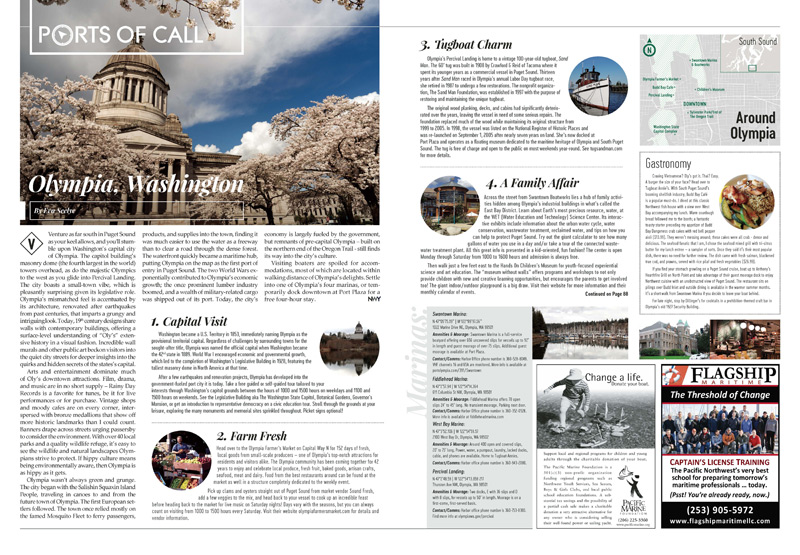Venture as far south in Puget Sound as your keel allows, and you’ll stumble upon Washington’s capital city of Olympia. The capitol building’s masonry dome (the fourth largest in the world) towers overhead, as do the majestic Olympics to the west as you glide into Percival Landing. The city boasts a small-town vibe, which is pleasantly surprising given its legislative role. Olympia’s mismatched feel is accentuated by its architecture, renovated after earthquakes from past centuries, that imparts a grungy and intriguing look. Today, 19th century designs share walls with contemporary buildings, offering a surface-level understanding of “Oly’s” extensive history in a visual fashion. Incredible wall murals and other public art beckon visitors into the quiet city streets for deeper insights into the quirks and hidden secrets of the states’s capital.
Arts and entertainment dominate much of Oly’s downtown attractions. Film, drama, and music are in no short supply – Rainy Day Records is a favorite for tunes, be it for live performances or for purchase. Vintage shops and moody cafes are on every corner, interspersed with bronze medallions that show off more historic landmarks than I could count. Banners drape across streets urging passersby to consider the environment. With over 40 local parks and a quality wildlife refuge, it’s easy to see the wildlife and natural landscapes Olympians strive to protect. If hippy culture means being environmentally aware, then Olympia is as hippy as it gets.

Olympia wasn’t always green and grunge. The city began with the Salishin Squaxin Island People, traveling in canoes to and from the future town of Olympia. The first European settlers followed. The town once relied mostly on the famed Mosquito Fleet to ferry passengers, products, and supplies into the town, finding it was much easier to use the water as a freeway than to clear a road through the dense forest.
The waterfront quickly became a maritime hub, putting Olympia on the map as the first port of entry in Puget Sound. The two World Wars exponentially contributed to Olympia’s economic growth; the once prominent lumber industry boomed, and a wealth of military-related cargo was shipped out of its port. Today, the city’s economy is largely fueled by the government, but remnants of pre-capital Olympia – built on the northern end of the Oregon Trail – still finds its way into the city’s culture.
Visiting boaters are spoiled for accommodations, most of which are located within walking distance of Olympia’s delights. Settle into one of Olympia’s four marinas, or temporarily dock downtown at Port Plaza for a free four-hour stay.



